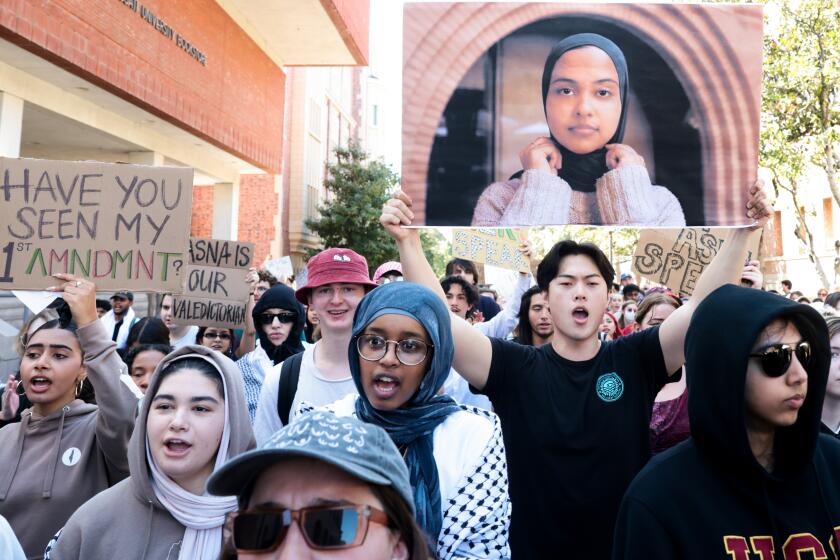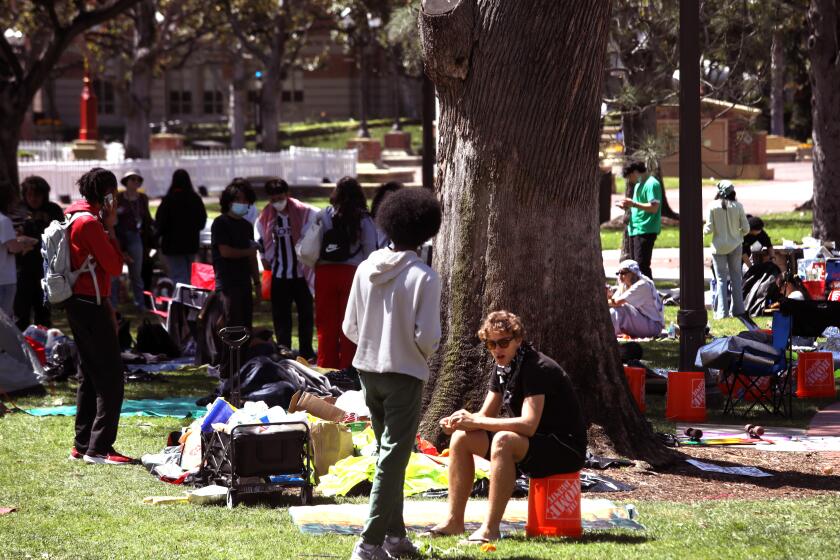Teaching Assistants Can’t Unionize, U.S. Panel Says
A federal labor ruling has dealt a potentially devastating setback to the growing union-organizing movement among graduate students who work as teaching and research assistants at some of the nation’s most prestigious private universities.
The National Labor Relations Board declared that those graduate students don’t have legal rights to form unions because they primarily are students, not employees. The decision, quietly released Thursday by the Republican-dominated panel, reverses a position taken by the agency in 2000, when it was controlled by Democrats.
The case stems from a union-organizing campaign by the United Auto Workers involving 450 graduate students working as teaching and research assistants at Brown University. The board’s 3-2 decision applies to all private universities. It figures to halt, or at least severely hamper, recent efforts to organize graduate students at such institutions as Yale, Tufts, Columbia and Penn.
Ten major private universities -- including USC and Stanford -- had filed amicus briefs in support of Brown’s position contesting the union drive.
The ruling is expected to have little or no effect at the nation’s public universities, including the University of California, which are governed by state labor laws. In December, UC reached a three-year agreement with the union representing 11,000 graduate students. Graduate students in the California State University system have also begun efforts to form a union.
New York University is the nation’s only private school with graduate students working under a union contract, labor and education officials say.
Graduate students play a pivotal role in higher education, providing a relatively low-cost workforce to handle extensive teaching and research duties.
The board’s decisions usually are final, but in some cases they have been appealed to the U.S. Supreme Court. Some higher education officials said labor activists may wait to see if the Democrats retake the White House this fall, bringing labor-friendly appointees who might restore the students’ organizing rights.
Richard Klimmer, an organizer for the American Federation of Teachers working on a union campaign for University of Pennsylvania graduate students, said his group would now seek “voluntary recognition” of a union by the university.
Though the board’s ruling rejects the right of graduate students to organize, it does not prohibit such a union if the university agrees to acknowledge it, Klimmer said.
University administrators described their opposition to the unions as based on a desire to preserve academic freedom.
In a statement, Brown University Provost Robert J. Zimmer said, “Teaching undergraduate students and conducting research are an integral part of the academic development for graduate students. The NLRB correctly recognizes that a graduate student’s experience is a mentoring relationship between faculty and students, and is not a matter appropriate for collective bargaining.”
Debra Zumwalt, Stanford’s general counsel, said she was “heartened” by the board’s decision.
“We just feel strongly that, to further the education of our students, we need to be able to make those decisions and not negotiate them on a mass basis through collective bargaining,” she said.
Zumwalt noted that, in the mid-1970s, the board ruled that graduate students could not form unions in a case that stopped organizing efforts at Stanford. In 2000, the labor relations board cleared the way for graduate students to unionize at NYU, providing a four-year window for organizing activity nationwide.
Union leaders expressed anger over the new ruling.
“This reflects the Bush administration and their anti-worker attitude and bias,” said Alan Reuther, legislative director of the UAW in Washington.
Sheyda Jahanbani, a Brown University doctoral student who has been active in the UAW organizing drive, said she and other graduate students do not yet know how to proceed.
Jahanbani, who said she would earn $16,000 next year as a history teaching assistant, said she and her colleagues were concerned about poor working conditions, pay and benefits. She said heavy teaching loads have kept her from being “the kind of teacher I wanted to be.”
More to Read
Start your day right
Sign up for Essential California for news, features and recommendations from the L.A. Times and beyond in your inbox six days a week.
You may occasionally receive promotional content from the Los Angeles Times.






